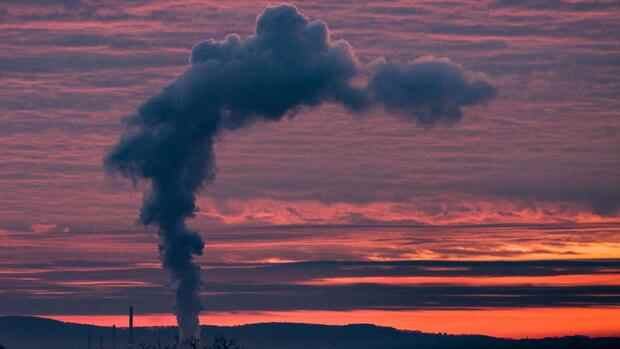The energy industry sees emissions trading endangered by the reform plans.
(Photo: dpa)
Berlin From the point of view of the industry, the EU Commission’s plans to fight against dependence on Russian energy supplies by selling emission certificates are a step in the right direction. The Commission wants to sell certificates that are currently parked in the so-called market stability reserve (MSR) in order to have money available for the transformation of the energy supply system.
We welcome the Commission’s proposal to sell allowances from the MSR. This brings additional certificates onto the market and could stabilize or even reduce the price of certificates, said Christof Bauer, chairman of the Energy Committee of the German Chemical Industry Association (VCI), the Handelsblatt. The reserve is driving up certificate prices in an uncontrolled manner. It is therefore “by no means a blessing, but an additional burden for industrial companies,” he added.
The market stability reserve was introduced in 2019. Initially, 900 million certificates were taken off the market and transferred to the MSR. In addition, residues from the auctioning of allowances are included in the MSR. If a certain amount of allowances in circulation is exceeded, they are diverted to the MSR. From 2023, the certificates in the MSR will be gradually deleted and thus permanently withdrawn from the market.
But the EU Commission is planning a change of course: It recently announced that it would auction 250 million certificates from the reserve in the coming years and put the intended proceeds of 20 billion euros into the Corona aid fund. The Corona relief fund is to be used to promote investments that reduce dependence on Russian energy imports.
Top jobs of the day
Find the best jobs now and
be notified by email.
This is exactly what the energy industry is up against. She considers it a misappropriation to use these to generate additional income for the Corona Aid Fund. The architecture of emissions trading is being “brought down by the EU Commission’s plan,” RWE CEO Markus Krebber and Felix Matthes from the Öko-Institut recently wrote in a joint guest article for the Handelsblatt.
“The consequences will be dramatic: there will no longer be a reliable path to emission reductions, the prices for pollution rights will fall and with them the incentives to switch to green technologies,” the article says.
Climate protection organizations have also heavily criticized the EU plans. If 250 million allowances are pumped into the market, this would tend to depress the price of pollution rights. The incentives for the energy sector and industry to invest in climate-friendly technology would decrease.
The emissions trading system introduced in 2005 is one of the most important climate protection instruments in the EU. The energy industry and industrial sectors such as steel, chemicals and cement are obliged to take part. The companies must provide evidence of a certificate for each tonne of CO2 emitted. The number of certificates is reduced year by year. This creates the incentive to invest in climate-friendly technology.
Industrial sectors that are in international competition are allocated some of the certificates free of charge, but the companies have to bear a considerable part of the costs themselves.
“Then we no longer need to compete against the competition from China”
This cost burden tends to increase. The industry criticizes that the MSR leads to an additional shortage of certificates. “In nominal terms, the number of certificates is reduced by 2.2 percent year after year. Due to the placement in the market stability reserve, the actual number of certificates is up to 25 percent lower every year,” says VCI man Bauer. “If this continues unchecked, the system will blow up in our faces. CO2 prices of 150 euros and more are then very realistic. As a result, European companies no longer have to compete against the competition from China, which currently pays three to five euros per tonne of CO2.”
Bauer warns: If the total number of certificates in circulation should have increased at the turn of the year 2022/23 due to the recession, this will inevitably result in an additional reduction in the number of certificates in the coming year. “This is exacerbating the recession cycle. This destabilizes the market and weakens the industry,” he criticized.
More: Conversion to hydrogen – economy sees itself slowed down

